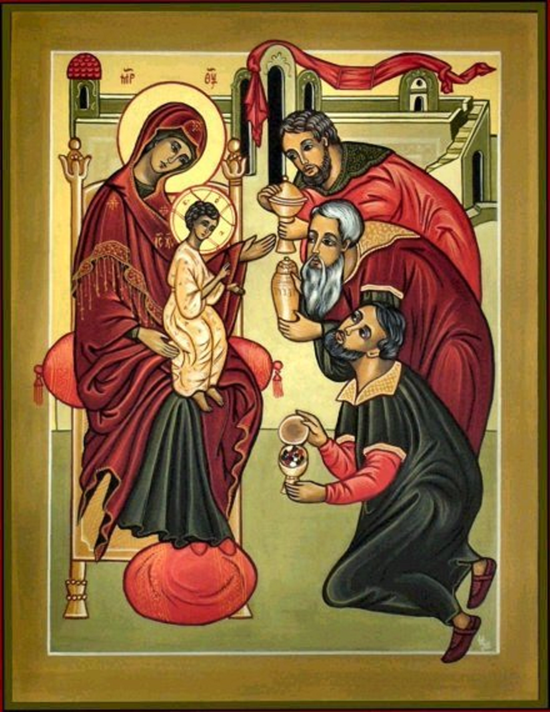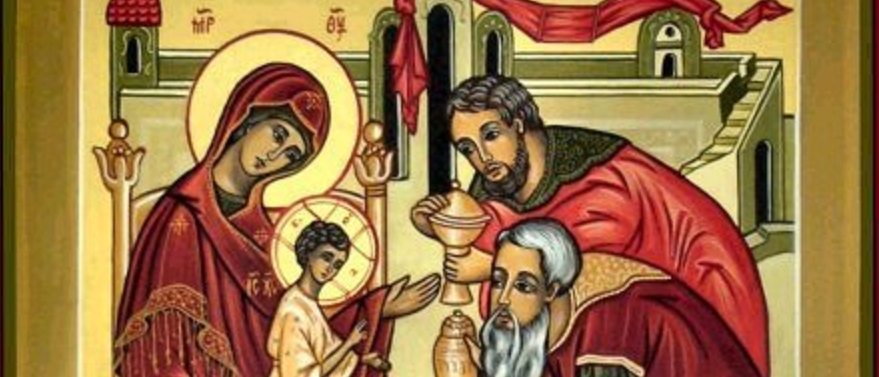Your Light Has Come
Epiphany Scripture Readings

I would venture a guess that the Gospel of Matthew, from which today’s gospel reading was taken, caused quite a stir when it first appeared in the Israeli Jewish community. It’s well-established among Scripture scholars that this gospel was originally written in Aramaic—the common language of the people of Israel at the time—although that document has never been found. The concern of Matthew’s Gospel throughout was to ground Jesus of Nazareth firmly within the Jewish community. That’s why the gospel begins with Jesus’s genealogy. That was to demonstrate to his Jewish audience that Jesus was not only a descendant of Abraham and heir to the promise, but he was also born of the house and lineage of David, from whom would come the long-awaited Messiah. The genealogy ends with “Jacob was the father of Joseph, the husband of Mary. Of her was born Jesus who is called the Messiah.” [Matthew 1:16]
What follows the genealogy and concludes the first chapter of Matthew’s Gospel is a brief—one- or two-paragraph—description of Jesus’s conception, ending with “[Joseph] had no relations with [Mary] until she bore a son, and he named him Jesus.” That one sentence is Matthew’s entire description of the birth of Jesus, a description that takes up an entire chapter in the Gospel of Luke. Instead, here we have the story of the magi. Matthew gives this narrative almost the whole second chapter of his gospel—a story that doesn’t even appear in any of the other gospels. The so-called “magi” were most probably Zoroastrian astrologer-priests from Persia. It was widely believed at that time in the Middle East that, when someone was born, a new star would appear. A great star would herald the birth of someone great. The magi were well aware that the Jewish people were anxiously awaiting a savior king, so when they observed a bright, new star, they made the connection and traveled to Jerusalem—the capital of Israel—and came to Herod, the king of Judea. From there, they were sent on to Bethlehem, the city of David, where the king in David’s line was to be born.
Why would the Jewish people find this story scandalous? Because foreigners—non-Jews—were reported to be the first to recognize and acknowledge the Messiah, while the people of Israel, from the lowest commoner to the king himself—remained oblivious. Remember that the Jewish people prided themselves on their unique and privileged relationship with Yahweh God. They looked down on heretics like the Samaritans who, after all, worshipped the same God, and they had nothing but contempt for the unbelievers, the pagans, and the Gentiles. Yet, it was from these despised people that representatives came to give homage to him who was called the Messiah. Not only that but as they did so, they fulfilled the prophecies from Isaiah that we heard in our first reading and from the psalm we just heard sung.
There’s a message for us in this gospel passage. The message is simply that God doesn’t play favorites. God’s chosen people are those who are open to receive his grace and who are willing to respond to it. The magi looked for a sign and a sign was given them. Miracles happen daily all around us. When we look for miracles, miracles are given us. The criteria for receiving signs and miracles are as simple as they are difficult to fulfill: to live with honesty, openness, and willingness. Like in the case of the magi, there are criteria, but there are no prerequisites. The magi did not have to subject themselves to the Law of Moses in order to be granted access to the Messiah king.
So, what prerequisites do we set in order to grant people access to the grace of God today? Is it communion with the Holy Father, the Pope? Is it baptism in the name of the Father, and of the Son, and of the Holy Spirit? Is it the belief that Jesus is the Messiah and Son of God and my personal savior? Is it acceptance of the Scriptures as God’s word? Is it belief in God? Is it belief in life after death? What is the prerequisite to be “saved?” It’s none of those things, and that’s the message of today’s gospel.
Once again, God’s grace has no prerequisites, only the criteria of honesty, openness, and willingness. Our knowledge about God, the Holy Trinity, our Scriptures, our doctrines and beliefs, even our liturgies and spiritual practices all help to bring us where we need to be, and that is to be able to trust the God we cannot perceive and cannot understand. Sometimes, our knowledge, beliefs, and practices get in the way of that radical trust, that honesty, openness, and willingness, that brings us into a personal relationship with God. Having all that our religion provides us with doesn’t make us any better or more worthy of God’s love than those who profess not to believe.
How do we know that we’ve met God’s criteria for receiving his grace? How do we know that our level of honesty, openness, and willingness is enough? Once again, we can look to the magi. They looked for a sign, and a sign was given them. What came next was their response. The question in their minds was, “Now, what are we to do?” They got up from their seats and went out looking. Grace is never given just to make us feel good or even important. Grace is a motivator and an empowerment. Grace demands a response. If we’re given a star to guide us, trusting God means getting up and following it. We can tell that we’re in a state of grace if we’re uncomfortable, if we’re inspired and motivated to do something. That’s grace in action and, when we respond to grace with action, grace is manifest, and Epiphany happens. Like the magi, in our response to God’s grace, the world experiences the birth of the Messiah.
Get articles from H. Les Brown delivered to your email inbox
